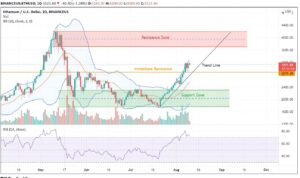
In the recent World Blockchain Summit in Dubai, many blockchain industry leaders visited the CoinQuora media lounge. Thomas Nägele, President of the Crypto Country Association Liechtenstein visited us and gave us some insights into what they do at the Crypto Country Association Liechtenstein.
Q. Please introduce yourself and CCA.
Sure, my name is Thomas Nägele, and I’m an Attorney-At-Law from Liechtenstein. It’s a small principality in the heart of Europe. I’m also the president of the Crypto Country Association (CCA) Liechtenstein. And, we are here in Dubai. I am a speaker at the blockchain summit today and we spoke about regulatory challenges. And, that’s what I do. I was a part of the workgroup of the Liechtenstein government writing the Liechtenstein legislation, which is called the blockchain act. And because it’s such a very comprehensive approach, and how we addressed all of the major questions, now, they are arising in other jurisdictions as well, like DeFi, and NFTs, we already covered that. And this legislation is enforced first of January 2020. And the idea is here to exchange thoughts to talk to the local ecosystem, and just to explore the local ecosystem, and I think I have been here since Sunday, and it is amazing what is happening in Dubai, you see that a lot of companies are moving here setting up their business. So it’s, it’s just amazing to see what is happening here.
Q. How’s the regulation going in your country? Is it going through a positive? Or are there some opposition to blockchain and cryptocurrency like we’ve seen in other countries like China?
Liechtenstein started 2016 to think about regulation. So the idea back then was to decide first, whether we want to just leave it as it is and don’t regulate it in any case, or if we want to regulate it and find another approach. And that actually answers your question. It’s enforced since the first of January 2020, so we regulated it, but I think we found a rather balanced approach.
Because when you think about regulation, that industry and that’s actually, that’s what I tell a lot of other lawmakers around the globe, because when they asked me how they should approach these issues, always tell them to get educated first, and that’s what was happening in Liechtenstein.
So there was a lot of effort put into understanding the technology and this, then why it is so different from what we saw before. And if you have that as a solid ground, you can think of where you really need regulation, because for example, if we now think like this, because most regulation we see so far is to protect investors. So they regulate, for example, if companies are fundraising, or if they provide exchange services, we said no, what we want to do is we want to provide the legal framework for the token economy, so for everything, so for example, if Yes, for sure, if we provide exchange services that’s also regulated, you have a license there a clear path how to do that. But in addition to that, you can tokenize almost any asset in Europe, in Liechtenstein with our token container model, that’s the model we have in our legislation. And the interesting thing, and that’s why I call it. I was a coder for almost 10 years, I call it the blockchain is the base layer, the protocol layer. And our law is actually the enforcement layer.
For example, if I read if I let a token represent a piece of art that was going to have like, if you want to issue an NFT today, and you say like this NFT is representing that piece of art. What you can do is if you transfer the token, I hope I mean, if you buy an NFT telling you, you’re the owner of that piece of art, and if you transfer the token to me, I would ask you Ezra. Okay, now I’m the token holder, but I’m also the owner of the piece of art, and you need that legal enforceability. So you need to have an enforceable claim. So that’s what we provided in Liechtenstein. And just to give you a little bit perspective, why is that of essence because Liechtenstein is very small. So we know that we like it, it’s just, it could serve as a blueprint. And it does, because the European Commission issued their draft of legislation for Europe in September 2020. And if I analyze, and if a check, like the level of regulation is quite similar, that’s a good opportunity, if you want to start in Europe, you can start in our country.
We are also a member of the European Economic Area and when this new regulation comes, you can actually make use of that and attract the 400 million market. So we are in Europe, generally speaking, quite open and the good thing is and I think that’s the difference is that they really get themselves educated first. They understand what is happening here, and then provide a solid framework for it and I think that’s what entrepreneurs need.
Q. Do you have any thoughts on mining?
When we think about regulation in the act itself, you don’t find something which covers mining, and I think that is for good reason. First of all, mining is something that really depends on how you organize that we all know that and it is not something you do in our country, because the energy prices are just too high. So we don’t have mining companies in our country. But here’s the thing with mining, people are concerned about environmental issues. That is true. And we have to have a close look at that, what was happening there.
But, on the other hand, you have to really put things into perspective because if you think about mining and the energy consumption, I mean, that’s a very transparent system like blockchain, and you know, exactly the energy consumption of the blockchain system and so you can say, like, there is really a huge consumption.
But on the other hand, you will get a use out of it. I mean, it’s not that you don’t waste that energy, it has a certain use to make secure transactions and the difference is just that it is so transparent, that everybody can check what a transaction is consuming energy. If you compare that, for example, to our existing monetary system, you don’t have any figures you don’t know how much energy is consumed not only by printing there with the banking notes and like having the coins, but also all of the intermediaries, which which are actually needed to operate such a system. So I think to be fair, yes, I think it is an issue and we have to constantly evolve for sure. But it has a use. It’s needed to do that energy. And on the other hand, I think we are not that bad in comparison to some other things.
Q. Are there any projects that we should know about? Where will you see where we will see you next?
I mean, what I can tell you is that Liechtenstein is in general, quite open, I think, yes, what we are actually offering is a dialogue. You can talk to our regulator directly, you can talk to our government, we have an ecosystem, we have like this specific piece of legislation. I tell everybody, if you think about going to jurisdiction, do your homework, ask local advisors, what is needed, and get yourself educated, and then decide on the jurisdiction question. So it’s not that Liechtenstein is the best option for everybody. It really depends on what he would like to do. But it’s at least worth considering when you start to think about Europe. And you can see me next time in Lisbon and at the end of October coming back to Dubai mid-November. So if you follow me on LinkedIn, you’ll find me and then he will see where I’m speaking. Thank you very much. It was a pleasure to talk to you.
Source: https://coinquora.com/exclusive-interview-with-thomas-nagele-president-of-cca-liechtenstein/
- 2016
- 2020
- advisors
- All
- AREA
- around
- Art
- asset
- Banking
- BEST
- Bit
- blockchain
- business
- buy
- call
- China
- CoinQuora
- Coins
- coming
- commission
- Companies
- consumption
- Container
- countries
- crypto
- cryptocurrency
- DeFi
- Dubai
- Economic
- economy
- ecosystem
- energy
- entrepreneurs
- environmental
- Europe
- European
- european commission
- exchange
- Exclusive
- fair
- First
- follow
- Framework
- Fundraising
- General
- good
- Government
- here
- High
- homework
- How
- How To
- HTTPS
- huge
- idea
- industry
- insights
- Interview
- Investors
- issues
- IT
- JavaScript
- Law
- lawmakers
- Legal
- Legislation
- Level
- License
- liechtenstein
- local
- major
- Market
- Media
- million
- Mining
- model
- NFT
- NFTs
- offering
- Okay
- open
- Opportunity
- opposition
- Option
- Other
- owner
- People
- perspective
- plugin
- president
- projects
- protect
- Regulation
- regulatory
- Services
- setting
- Share
- small
- So
- Social
- Speaker
- start
- started
- Summit
- system
- Technology
- The Coins
- time
- token
- Token Economy
- transaction
- Transactions
- us
- What is
- worth
- writing
- years










